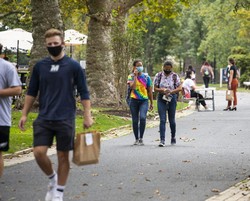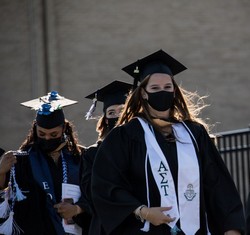Millennials, the generation defined by Nielson Media Research as adults between the ages of 22 and 38 years old, have faced two significant setbacks in their already short lives: the COVID-19 Pandemic and the 2008 Financial Crisis.
Few members of the millennial generation succeeded in making economic gains during the recovery after the The Great Recession of 2008, CNBC said, and the group had tapped into their retirement savings, began to rely on high-interest loans and racked up student debt to compensate.
Now, with the COVID-19 pandemic looming for the foreseeable future, the U.S. economy is not expected to fully recover until 2029, according to a report by the Wall Street Journal. For the second time in their short lives, a consistent millennial future has been stunted.
“A large proportion of the public remains bullish on their financial outlook despite any hit they may have taken during the outbreak,” Patrick Murray, Director of the independent Monmouth Polling Institute said in regards to a June poll concerning life returning to a “new-normal” post-covid. “That seems to be based on the expectation that they will quickly bounce back.”
As of Oct. 12, at least 214,000 people have died in the United States due to Coronavirus, with more than 7,728,000 cases reported.
Many fields and general ways of life have made the move online during the COVID-19 pandemic, including the University’s own teaching methods. Employers have begun to offer learning sessions over Zoom in order to better indoctrinate the soon-to-be millennial graduates to a contemporary online workplace.
Rekha Datta, Ph.D., Interim Provost & Senior Vice President for Academic Affairs, joined President Patrick F. Leahy Ed.D., in an open call to students at the start of the fall semester that detailed the University’s transition online.
“Since the [last] spring semester we have been spending a lot of time reflecting how we can [have] online classes, adding more quality, adding more communication and looking at it from the student perspective,” Datta said.
Travis Greenberg, a senior anthropology major, expressed concerns over breaking into a career post-graduation.
“My major is not sought after that much to begin with, and with people losing jobs in all fields, why would I be more likely to get a job [during the pandemic],” Greenberg questioned. “People who have lost their jobs are looking with more experience than me, and with businesses downsizing, they have less employees.”
According to the 2020 Deloitte Global Millennial Survey, close to half of respondents consider themselves stressed all or most of the time. This stress stems from a combination of job market anxiety, climate change nihilism and a stronger sense of individual responsibility.
Robert Meyers, a junior computer science student, detailed some of the pressure his generation faces.

“It’s always a bad feeling when you’re put into a situation that’s not your fault,” Meyers said. “I’m not saying [our generation] is perfect, but when it comes to topics such as climate change and the economy, we catch the short end of the stick for situations we didn’t create.”
When historians assess the aftermath of the 2020 COVID-19 pandemic on society, the response of millennials and Generation Z will be notable, said the 2020 Deloitte Global Millennial Survey.
“Battlehardened by the trying circumstances that have shaped their generations from the beginning, these younger generations are remaining steadfast, refusing to compromise their values—and that attitude may ultimately help change society.”
Sixty-nine percent of millennials consider having the option to work from home in the future a stepping stone to relieve stress, the survey stated. Sixty-seven percent believe working from home enables a better worklife balance, and 61 percent of respondents would prefer to use videoconferencing more in the future instead of traveling for work.
“Obviously, not every job can be done from home,” the survey said. “But a fair number can, and to no one’s surprise, that number jumped significantly during the COVID-19 crisis.
In the pulse survey, roughly a third of all employed respondents said they worked from home (or remotely) all or most of the time prior to the pandemic. During the peak of the pandemic, that percentage climbed to just more than half.”
PHOTOs COURTESY of Anthony DePrimo




